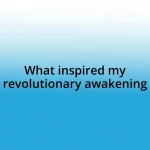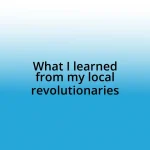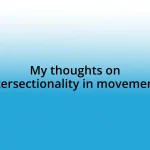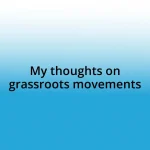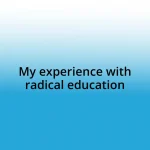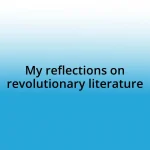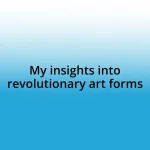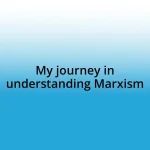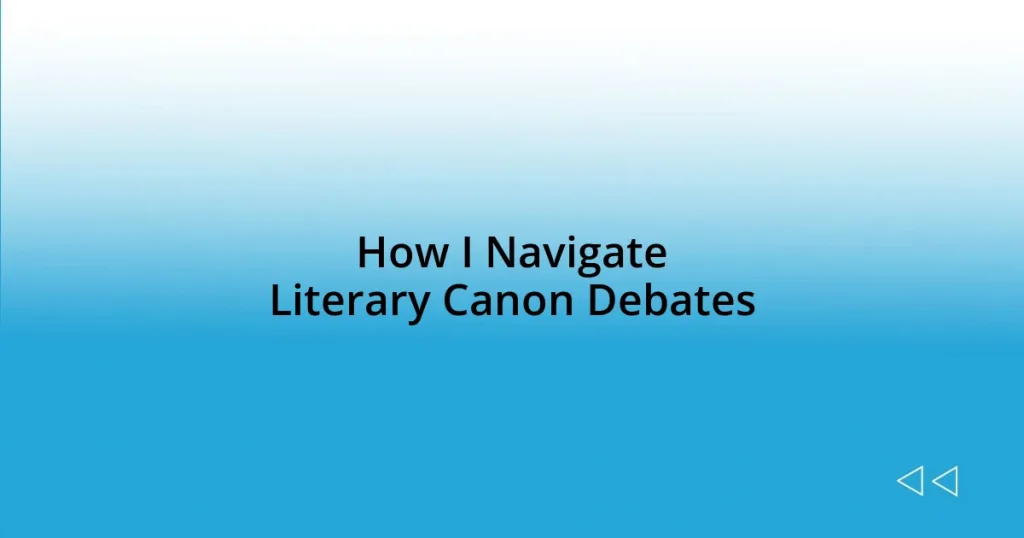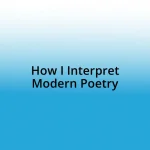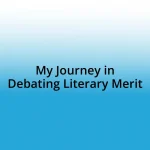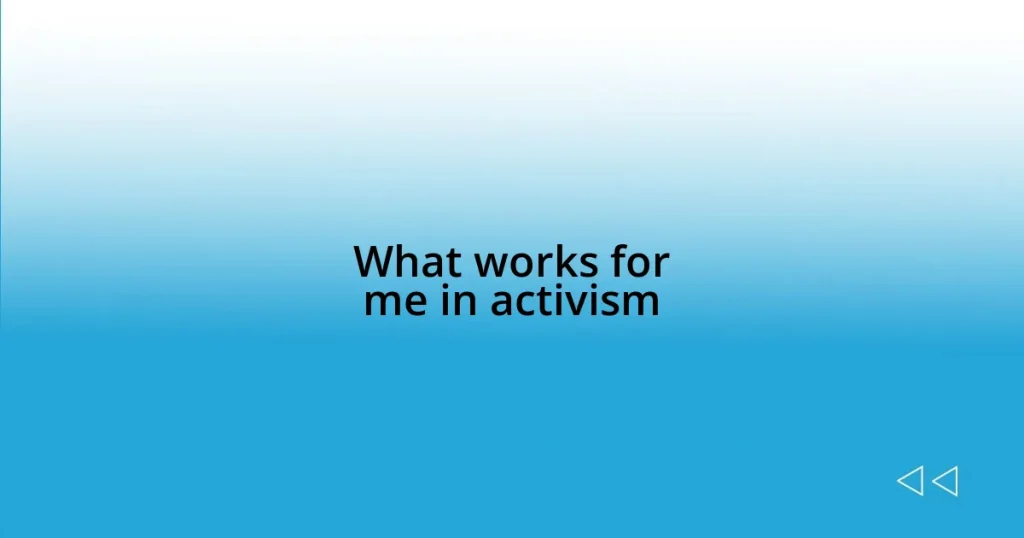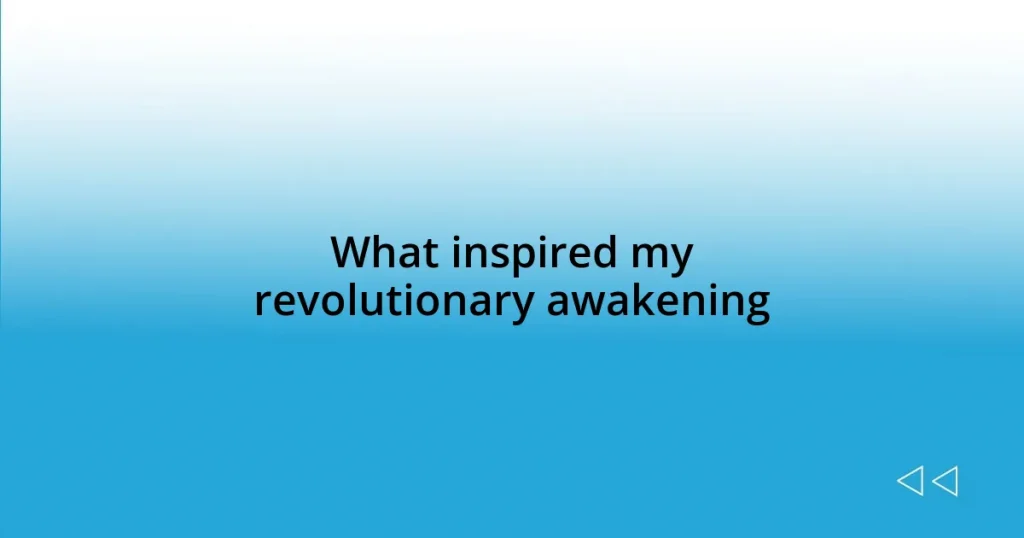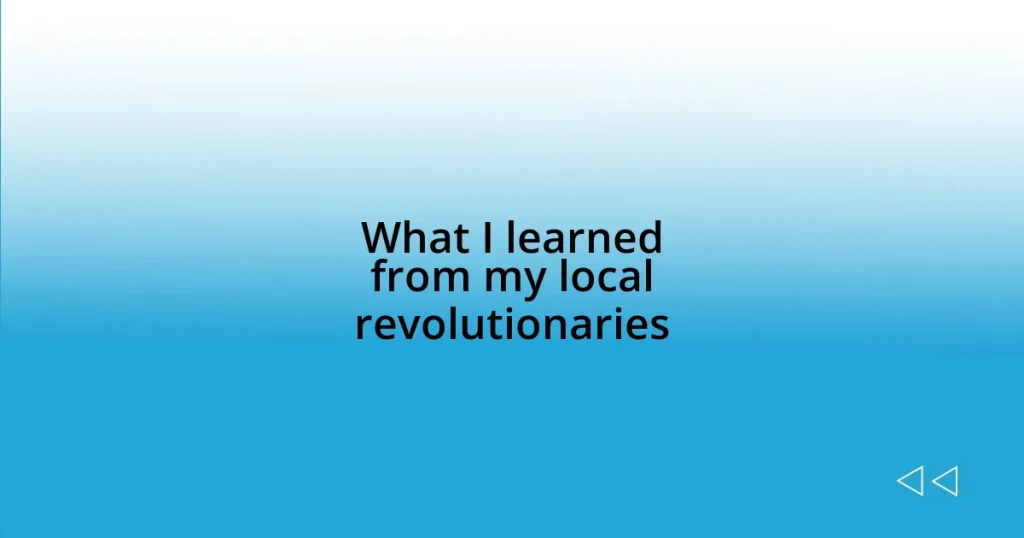Key takeaways:
- Literary canon debates highlight the struggle for inclusivity and representation, questioning who determines “great” literature.
- Engaging with diverse voices enriches understanding and challenges preconceived notions, fostering personal growth and cultural appreciation.
- Constructing a personal canon reflects individual experiences and values, emphasizing emotional impact alongside literary quality.
- Applying canonical knowledge allows readers to draw connections between historical texts and contemporary issues, enhancing collective interpretations of literature.
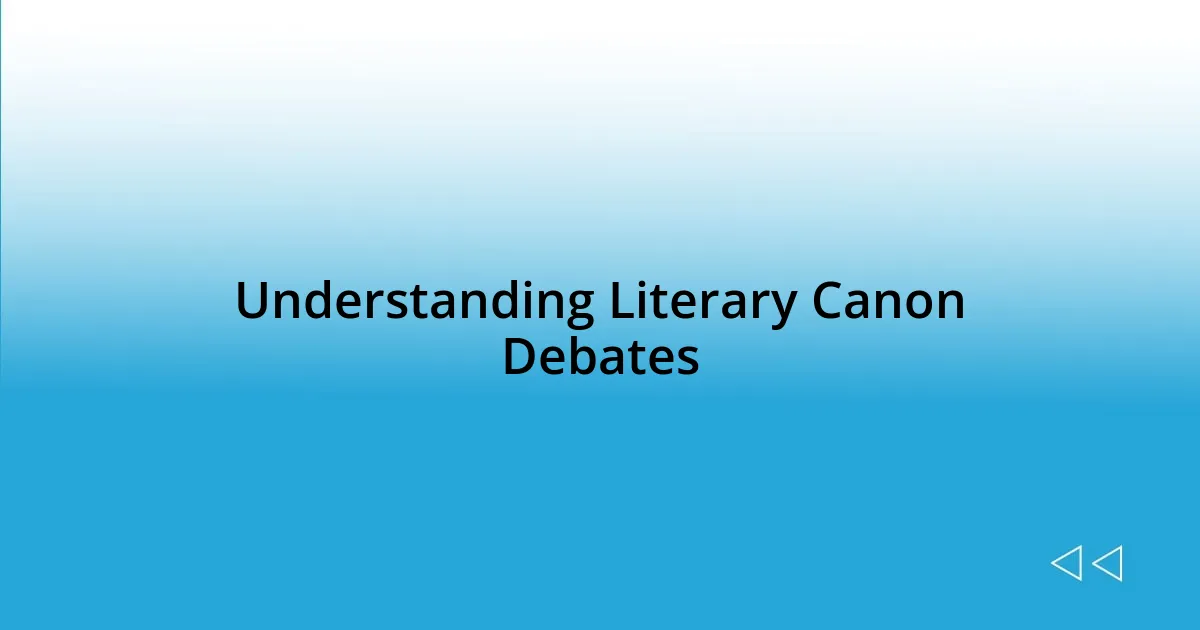
Understanding Literary Canon Debates
Literary canon debates are fascinating and often contentious discussions about which works should be considered essential in a given literary tradition. I remember my college days, when my literature professor prompted a heated debate about why some authors were revered while others were often overlooked. It made me wonder—who decides what is “great” literature, and how do cultural and historical contexts influence these choices?
As I delved deeper into these debates, I realized they aren’t merely academic musings; they’re deeply tied to identity and representation. I can’t help but feel a mix of frustration and excitement when I encounter voices from marginalized communities striving for recognition in a predominantly Eurocentric canon. Shouldn’t every narrative be given a chance to resonate and be valued?
Understanding literary canon debates also requires acknowledging their fluid nature. I recall reading a contemporary piece that challenged my preconceived notions of what “classics” could be. It made me realize that the canon is not static but is constantly evolving, influenced by changing social values, politics, and diverse perspectives. This ongoing dialogue prompts me to ask: How can we open our minds to alternative voices and stories that enrich our understanding of literature?
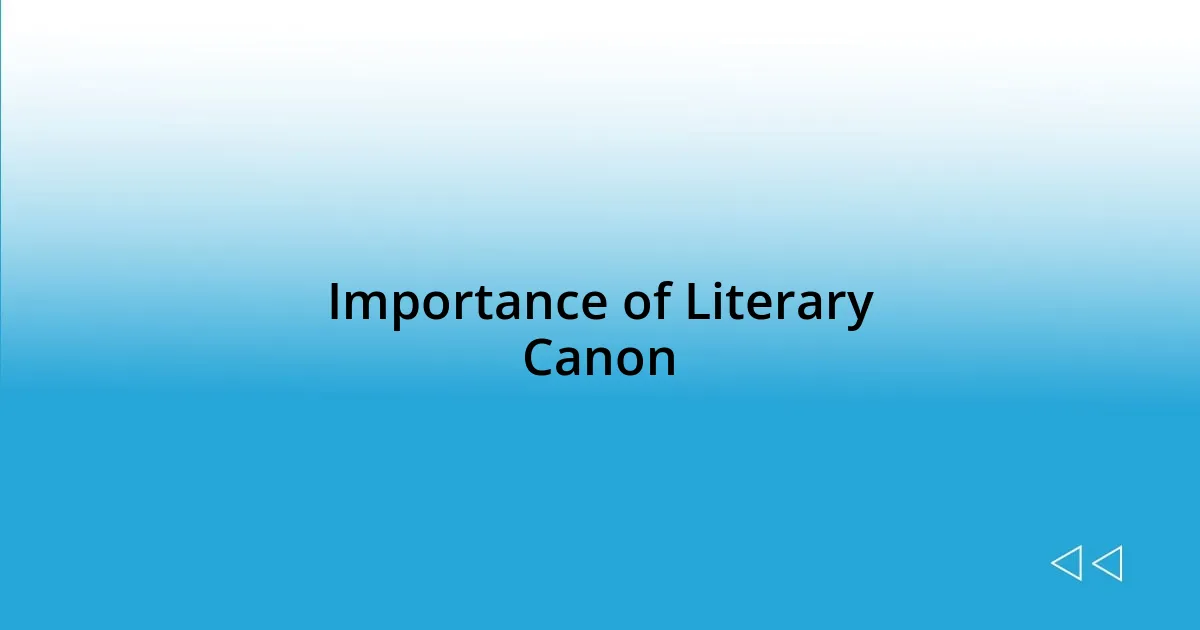
Importance of Literary Canon
The literary canon holds significant importance in shaping our cultural landscape. It acts as a guide, helping us understand the evolution of literary traditions and the values that have influenced them over time. I remember the first time I picked up a book from a widely accepted canon; it felt like stepping into a conversation with generations past. However, this same canon often overlooks voices that deserve to be heard, which is a perpetual reminder of the ongoing struggle for inclusivity in literature.
Here are a few reasons why the literary canon matters:
- Cultural Identity: It reflects the values, beliefs, and historical experiences of a society, allowing readers to connect with their heritage.
- Literary Standards: Canonical works often set benchmarks for literary quality, influencing future writers and shaping what is considered “great” literature.
- Critical Discourse: Engaging with the canon stimulates intellectual discussions and debates about representation and who has the authority to define literary merit.
As I reflect on my reading journey, it’s clear that the canon is more than a curated list; it represents a dialogue with the past while inviting us to challenge its limitations. Each book I read from the canon reminds me of the voices that are omitted and urges me to actively seek out diverse narratives that deserve a place alongside the classics.
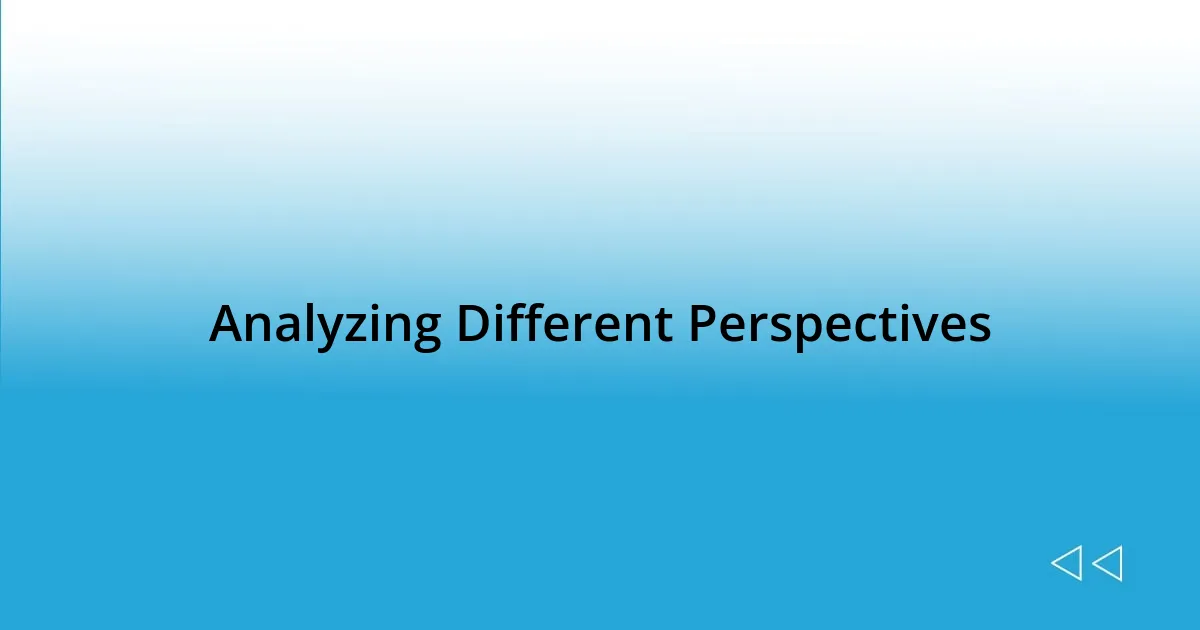
Analyzing Different Perspectives
Analyzing different perspectives in literary canon debates can be both enlightening and challenging. I recall once attending a panel discussion where scholars passionately debated whether a contemporary author should be included in the canon. Their differing opinions highlighted the fact that what resonates as significant for one could feel trivial to another. In the end, it dawned on me that these diverse perspectives are crucial—they provide a mosaic of experiences that enrich our understanding of literature.
As I’ve navigated these conversations, I’ve found myself drawn to the stories of writers from underrepresented groups. A friend of mine, an aspiring poet, shared her struggles with being seen in an academic setting that often privileges traditional texts. It made me realize how essential it is to listen to these voices. Every perspective uncovers not just a contrast, but a vital narrative that challenges the status quo and provokes deeper reflection.
Finally, I often draw parallels between the literary canon and my own reading journey. The more I seek out different viewpoints, the richer my understanding becomes. Once, I read a book by an author whose cultural background sharply contrasted with my own, and it opened my eyes to experiences I had never considered. These moments remind me that engaging with varying perspectives isn’t just an academic exercise; it’s an opportunity for personal growth and expanding our collective narrative.
| Perspective | Key Insight |
|---|---|
| Eurocentric Canon | Focuses on traditionally recognized authors, often neglecting marginalized voices. |
| Diverse Voices | Encourages inclusivity and enriches the literary landscape with varied narratives. |
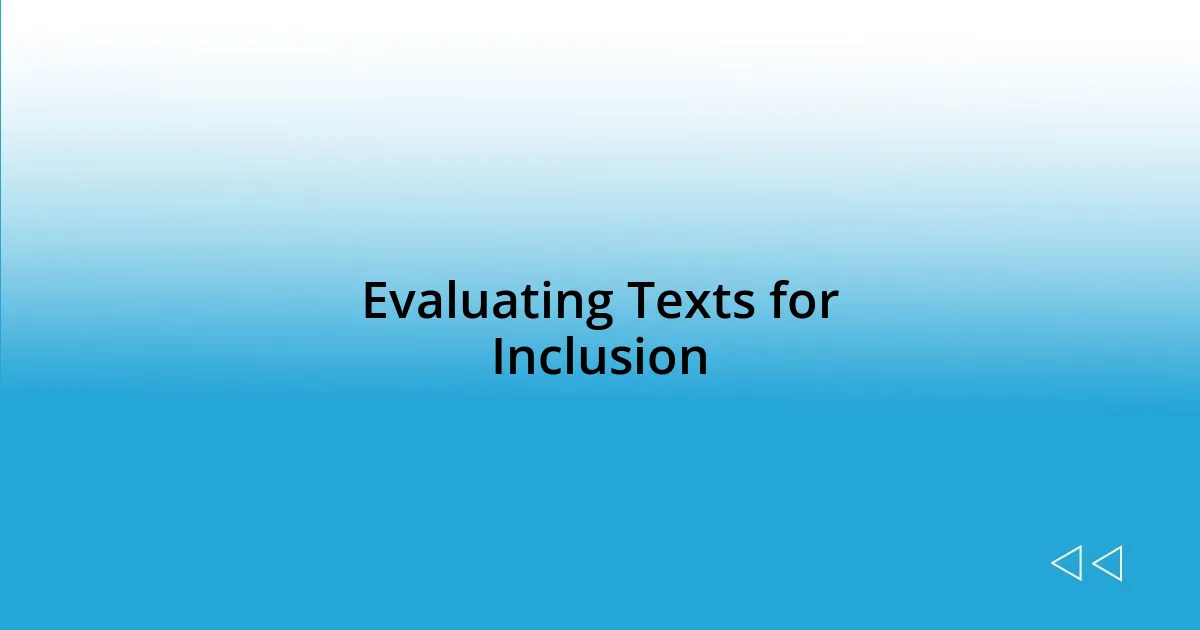
Evaluating Texts for Inclusion
When evaluating texts for inclusion in the literary canon, I find that it’s essential to weigh both literary merit and social resonance. I remember picking up a novel by a marginalized author that had been overlooked in favor of more traditional works. As I turned the pages, I felt a deep connection to the themes of identity and struggle—it was like discovering a piece of myself in a narrative that hadn’t received the recognition it deserved. How can we ignore such powerful voices when they reflect our complex reality?
It’s also fascinating to consider how different genres can broaden our understanding of what belongs in the canon. I recall a conversation with a friend who argued that graphic novels should be included alongside classical literature. Initially, I was skeptical, but after reading several impactful titles like “Maus” by Art Spiegelman, I had to acknowledge the depth of storytelling possible in this medium. Can a format challenge the traditional definitions of literary quality? I believe it can, forcing us to re-evaluate our criteria for inclusion.
Moreover, I often ask myself: are we merely adding titles, or are we cultivating a richer literary discussion? My own reading journey has prompted me to reflect on this question. As I embraced texts from diverse voices, I felt an exhilarating shift in my perspective. Each text not only fit into the larger conversation but also deepened my understanding of different cultures and experiences. It’s about enriching our literary landscape, not just filling a quota.
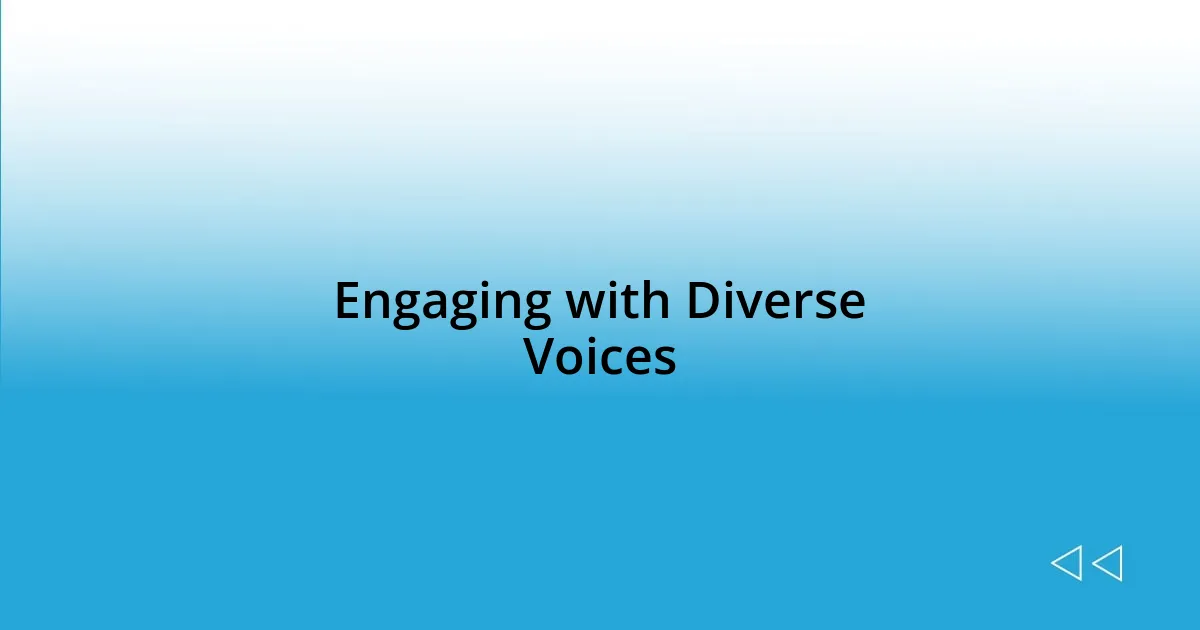
Engaging with Diverse Voices
Engaging with diverse voices has profoundly changed my approach to literature. I vividly remember the first time I joined a community book club that focused exclusively on works by authors from various backgrounds. The discussions were electric, filled with insights I had never encountered before. It was a revelation to see how different cultural experiences infused depth into every narrative. How often do we miss out on such rich conversations simply because we haven’t opened ourselves up to those voices?
There’s something incredibly powerful about hearing stories that challenge my own life experiences. I was struck by a memoir I read written by a refugee—each chapter invited me into a world so contrasting yet deeply human. The author’s resilience shone through the struggles, and I felt an emotional connection that transcended the pages. It made me question the narratives I had always accepted. Why should we confine our literary discussions to a narrow spectrum when the world is bursting with stories yearning to be told?
I often reflect on how engaging with diverse perspectives contributes to a more inclusive literary landscape. Participating in workshops that featured authors from marginalized backgrounds allowed me to hear firsthand about their creative processes and the barriers they faced. This has taught me that literature can be a bridge, connecting disparate worlds through shared humanity. After all, isn’t it enriching to share and understand the myriad stories that shape our society?
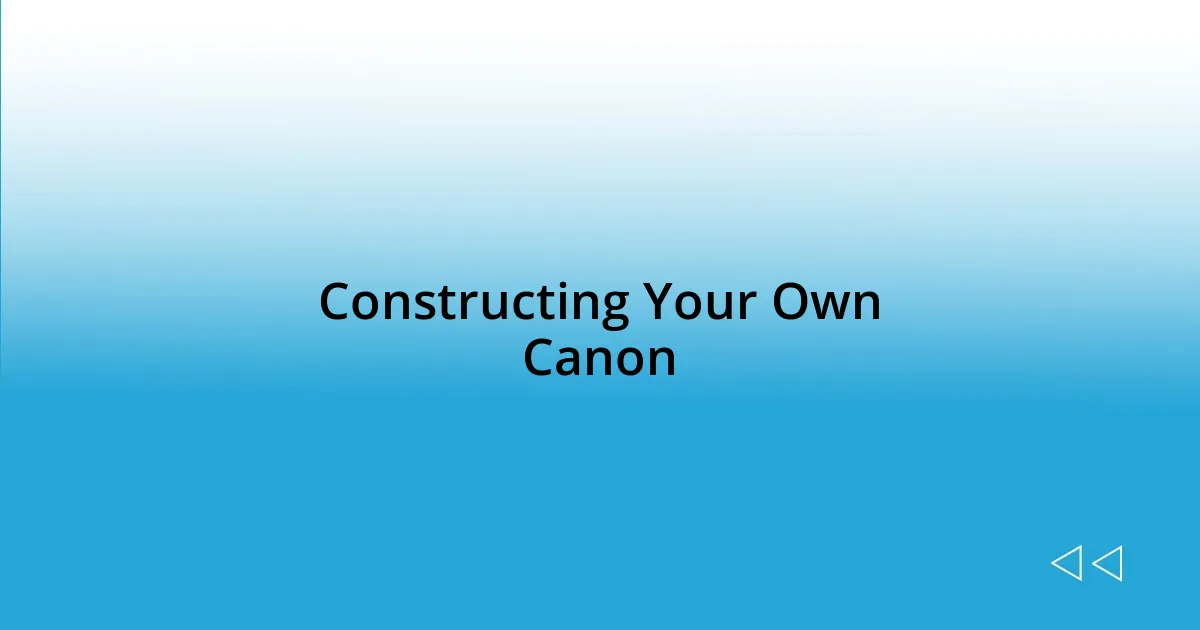
Constructing Your Own Canon
Constructing your own literary canon is an incredibly personal journey for me. I remember sitting in my favorite reading nook, surrounded by a stack of books that resonated with my experiences and passions. Each selection wasn’t just about literary acclaim; it reflected the voices and stories that echoed my own life, revealing the power of literature to shape identity. How can we ignore the texts that speak directly to our hearts?
One crucial aspect of my canon-building is the interplay of personal experience and aesthetic appreciation. I often find myself drawn to works that challenge societal norms or provoke thought, like a novel about social justice themes that kept me awake at night. It ignited a passion within me, pushing me to examine uncomfortable truths. Who would have thought that literature could not only entertain but also serve as a catalyst for self-reflection and change?
Furthermore, I encourage others to think about the criteria they set when constructing their own canon. Is it purely literary quality, or is there room for emotional impact? I recall a poetry collection that, while not widely recognized, captured my spirit during a challenging time in my life. Each word resonated with my struggles, transforming the pages into a source of comfort and understanding. Isn’t that what literature is ultimately about—connecting with our innermost selves and the world around us?
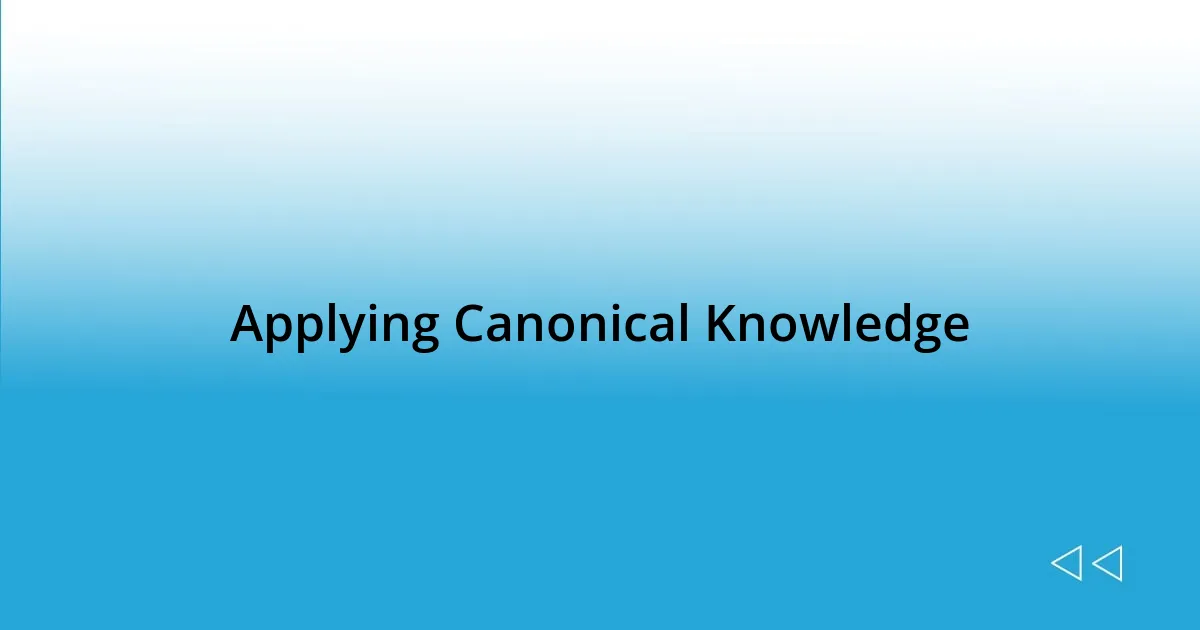
Applying Canonical Knowledge
Applying my canonical knowledge has been a transformative experience that continuously shapes my reading choices. I can clearly recall the moment I decided to revisit classics with a fresh lens, considering historical contexts and cultural critiques I hadn’t thought of before. When I re-read “Pride and Prejudice,” for instance, I was struck not just by the romantic plot, but by how social class influences relationships. Have you ever felt that a novel suddenly spoke to you in ways you never expected?
One way I apply this knowledge is by making connections between canonical works and contemporary issues. For example, when I read “The Great Gatsby,” the themes of aspiration and disillusionment resonated with me even more amid today’s social dynamics. It made me ponder: how do the dreams of characters like Gatsby reflect our current societal aspirations? This reflection is crucial, as it helps me understand how literature can serve as a mirror to our current lives.
Moreover, I often incorporate canonical knowledge into discussions with friends and peers, which enriches our understanding of texts we read together. I remember leading a discussion about the representation of gender in Victorian literature; the insights shared opened up a dialogue that challenged our preconceived notions. Isn’t it fascinating how sharing interpretations can unveil layers of meaning in texts we thought we knew so well? It reinforces the idea that our lens shapes our understanding, and applying canonical knowledge becomes a collective exploration rather than a solitary endeavor.


